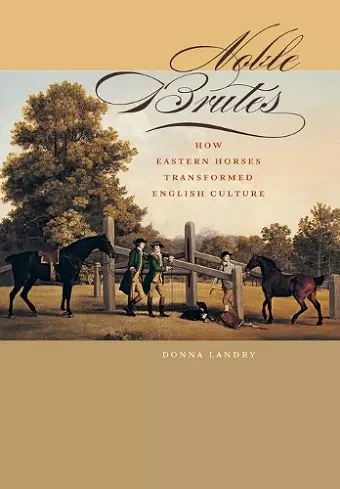Noble Brutes
How Eastern Horses Transformed English Culture
Format:Hardback
Publisher:Johns Hopkins University Press
Published:11th Feb '09
Currently unavailable, and unfortunately no date known when it will be back

Landry has made an attractive contribution to the emerging field of 'animal history' and to the larger field of cultural studies. -- Susan Staves, Brandeis University
This radical reinterpretation of Ottoman and Arab influences on horsemanship and breeding sheds new light on English national identity, as illustrated in such classic works as Jonathan Swift's Gulliver's Travels and George Stubbs's portrait of Whistlejacket."His lordship's Arabian," a phrase often heard in eighteenth-century England, described a new kind of horse imported into the British Isles from the Ottoman Empire and the Barbary States of North Africa. Noble Brutes traces how the introduction of these Eastern blood horses transformed early modern culture and revolutionized England's racing and equestrian tradition. More than two hundred Oriental horses were imported into the British Isles between 1650 and 1750. With the horses came Eastern ideas about horsemanship and the relationship between horses and humans. Landry's groundbreaking archival research reveals how these Eastern imports profoundly influenced riding and racing styles, as well as literature and sporting art. After only a generation of crossbreeding on British soil, the English Thoroughbred was born, and with it the gentlemanly ideal of free forward movement over a country as an enactment of English liberties. This radical reinterpretation of Ottoman and Arab influences on horsemanship and breeding sheds new light on English national identity, as illustrated in such classic works as Jonathan Swift's Gulliver's Travels and George Stubbs's portrait of Whistlejacket.
This is a fascinating thesis, absorbing in its many insights and detours, and lovingly argued. -- Allan Mallinson Country Life 2009 Only someone who is both a cultural historian and a devoted horse person could have written this remarkably engaging, wide-ranging book. Landry... tells in clear, vivid, fascinating detail of developments that will engage cultural and literary historians and animal fanciers. Choice 2009 Donna Landry has produced a book of clean organization and admirable coherence. She writes with telling precision, as well as first-hand acquaintance with all horsey matters. -- Pat Rogers Times Literary Supplement 2010 An important and most welcome contribution to our understanding of the multi-faceted impact of horses on humans and focuses on the significant influence of Eastern imports on English culture... Johns Hopkins University press have published a book with exemplary production values to complement the content. -- Peter Harrigan Arabian Studies 2010 A timely and valuable contribution to the recently burgeoning field of animality and animal studies in the early modern period. -- Richard Nash Eighteenth-Century Studies 2010 It would make a surprising story and support claims that animal studies can make important contributions to the study of history and culture. -- Nicholas Russell American Historical Review 2009 A multi-faceted work that will serve as a landmark in the emerging field of animal and cultural studies. -- Peter Edwards Agricultural History 2010 All historians of the early modern period would benefit from reading this multi-faceted and fascinating book. -- Mike Huggins Journal of Social History 2010
ISBN: 9780801890284
Dimensions: 229mm x 152mm x 22mm
Weight: 476g
248 pages